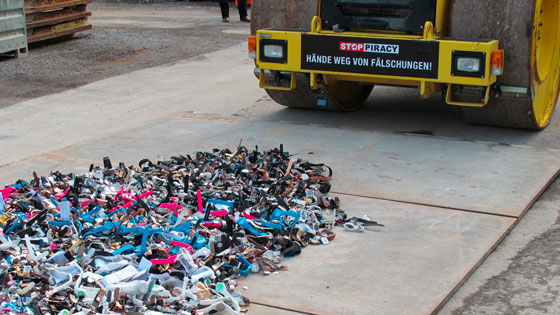
The Organisation for Economic Co-operation and Development (OECD) has revealed the shocking results of a study conducted on the counterfeit trade in Switzerland.
Affecting several sectors (watchmaking, pharmaceuticals, ready-to-wear), this scourge is seriously damaging the companies concerned, including income losses of CHF 4.5 billion and 10,000 fewer jobs.
The Organisation for Economic Co-operation and Development (OECD), commissioned by the Swiss Federal Institute of Intellectual Property (IPI), has carried out a study which for the first time quantifies the impact of the counterfeiting industry on the Swiss economy. The losses are so great that they require resolute action by all.
Global trade in counterfeit “Swiss” products such as watches, household appliances and medicines causes significant economic damage, as well as sometimes impacting health. In 2018, customers across the world paid over two billion Swiss francs for counterfeit “Swiss” products – believing they were buying an original. In the long term, this threatens the good reputation of Swiss enterprises.
Alongside reputation, revenue is also suffering. Swiss companies were cheated out of around CHF4.5 billion in 2018. The watch and jewellery industry was most affected, with a loss in turnover of CHF2 billion. However, counterfeiters also targeted goods from the machinery, electronics and metal industries. The turnover of these industries was diminished by around CHF1.2 billion. Other frequently counterfeited products marked with a Swiss label included clothing and shoes. Since the outbreak of the coronavirus pandemic and due to the increase in online trade, more counterfeit medicines have been seized.
According to the OECD, the vast majority of “Swiss fakes” came from China and Hong Kong, followed by Singapore and Turkey. India was also involved in the counterfeiting of medicinal products.
Foul play costs thousands of jobs
Less turnover also means fewer jobs. According to OECD figures, Swiss companies could have offered over 10,000 more job positions in 2018 if the counterfeiting industry did not exist. The watch and jewellery industry alone lost four out of ten jobs. Moreover, the public sector was also affected: according to the study authors’ estimates, this amounted to a shortfall in revenue of CHF160 million.
The OECD took into account all counterfeits seized worldwide that primarily infringed the trademark rights of Swiss companies as a basis for the study. The authors factored in that, in around half of the cases, the consumers consciously bought a counterfeit; this kind of purchase therefore did not replace the purchase of an original product.
Fight against counterfeiting strengthened
The authorities and the business community are already actively involved in the fight against the counterfeiting industry, including through campaigns aimed at raising consumer awareness. Stop Piracy, in partnership with the IPI, also orchestrated two massive destructions of counterfeit watches and fake medicines. Some 1.5 tonnes of timepieces were crushed by two steamrollers, while thousands of counterfeit medicine packets were burned, thus marking Switzerland’s position vis-à-vis this global scourge through powerful gestures.
Strong action was also carried out on social media, especially on Instagram, the shopping paradise for fake products. It mainly targeted young adults in order to raise their awareness of counterfeiting and piracy through an influencer campaign. Stop Piracy took the approach of cyber criminals themselves. Falsifying the identities of well-known fashion, lifestyle, beauty and music influencers, it advertised imaginary watches, perfumes and food supplements in their names. Instead of accessing so-called online shops, potential buyers were redirected to a homepage created by the institution with a clear message to raise awareness. All the influencers were of course on board, making their followers aware of online fakes and expressing their support for the work of Stop Piracy.
The OECD study provides a sound basis for taking targeted action against illegal activities in cooperation with political circles. For example, the IPI will in future make even greater efforts to include minimum standards for the enforcement of intellectual property rights in free trade agreements, with the aim of discovering and stopping counterfeiters at the point where infringement of rights begins.
Swiss Federal Institute of Intellectual Property
The Swiss Federal Institute of Intellectual Property (IPI) is the federal centre of competence for patents, trademarks, geographical indications, design and copyright.
The IPI is involved with the Swiss anti-counterfeiting and piracy platform Stop Piracy. It also monitors the key Swiss sales markets, including China, and intervenes in suspected cases of “Swissness” misuse.
April 15, 2021


 News
News